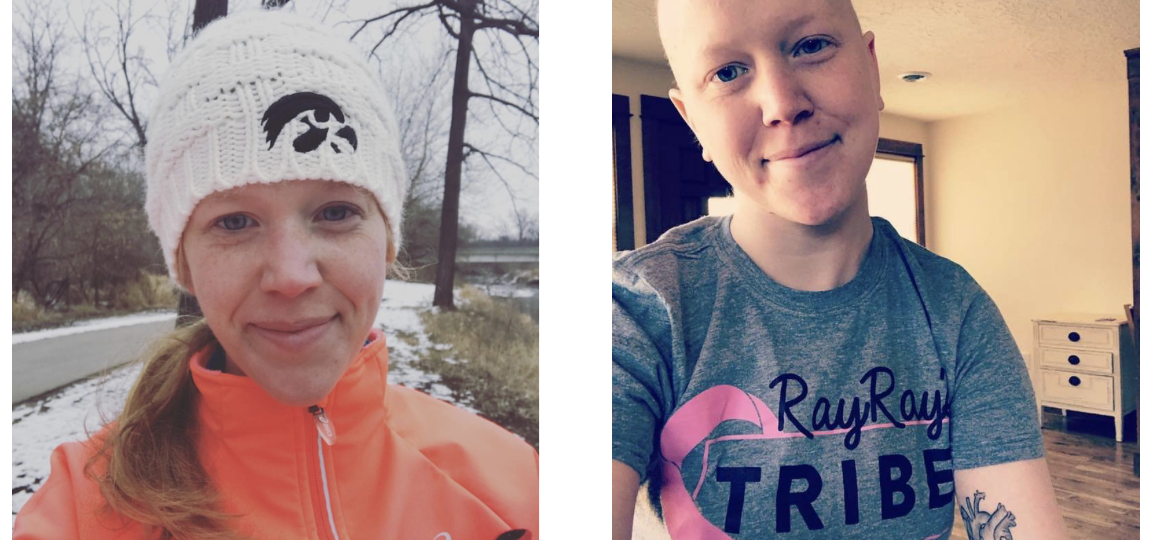
The two images above are of the same person (hi again, it’s Sarah’s colleague Rachel!) They represent two very different times in my life. They span a range of four years. But the one thing they have in common is that I was very, very sick in both photos. In one photo, it’s very obvious. I’m bald and sallow and very visibly fighting cancer. It’s even written on my shirt. But the other photo seems…normal. I look fine. I even look happy. What the photo doesn’t express is the internal turmoil that had been raging for quite some time. This photo represents a time in my life when I was very mentally ill. It was taken a few weeks before I had a mental breakdown at work and was taken in for an emergency psychiatric evaluation. But you wouldn’t guess that based on the photo. And I don’t have a shirt declaring “Rachel’s mental illness tribe!”
Why am I sharing this comparison? Because I was very ill both times. And I even shared my diagnosis publicly both times. But what the support looked like for me was drastically different. When going through cancer, casseroles poured in, long lost friends showed up in droves asking how they could support me, fundraising plans were immediately created for the medical expenses. I felt entirely supported in all aspects of my life. It was just this unspoken rule that when I needed help, it would be there.
But let’s flash back to 2016. I was starving myself, and also training for a marathon. I had self-selected to stop taking my antidepressants. I wasn’t going to therapy. And on a near daily basis, I thought of how I would end my life. After my breakdown, I did publicly share my struggles. Yes, there were messages commending my bravery for sharing and reminders of how valuable my life was, but that’s where it stopped. But the reality is, I needed the same support while dealing with my mental illness that I did when dealing with my physical illness.
I had taken off a large amount of work, so my finances were heavily affected. Therapy (which is often not covered by insurance) was not cheap. I wasn’t cooking for myself; many days I could hardly muster up the drive to make toast. And most noticeably, apart from my immediate family, no one was checking in on me. No one sent cards. No one sent a “just thinking of you!” Facebook message.
We talked about this on our team call this week. The question was posed:
Why don’t people heed the same call and outpouring of tangible support when someone has a mental illness as they do with a physical illness?
The most obvious answer: we just don’t know what to say and it makes us feel uncomfortable. To this, we have a very simple answer. The six most powerful words you can say to someone dealing with a mental illness are: “I love you. Tell me more.” And YES, maybe they do need a meal train, Go Fund Me, free babysitting, house cleaning, etc. And perhaps, they just don’t know how to ask for that.
We also talked about a physical ailment being a technical problem (having a known solution) and mental illness being an adaptive challenge (requires testing, experimenting). I wasn’t cured after going through therapy or taking new antidepressants. Often times a mental illness requires testing different medications, finding a therapist who you trust, discovering coping mechanisms. It takes a lot of time and a lot of steps…and back steps. From a supporter viewpoint, this can be hard to grasp because there isn’t a cut and dry answer or treatment plan. And there is no cure for a mental illness. Know that mental illnesses can be unpredictable. They are difficult to diagnose, and what worked last month may suddenly stop working.
And lastly, there are still some people who just don’t believe that mental illnesses exist. And to that, we encourage you to watch this woman bravely tell her story and demystify the realities of a mental illness. Imagine already feeling broken and having someone dismiss what you’re going through. Imagine going through something that is actually a normal human experience, but being told you are making it up.
So, my friends, please remember those in your life who have a mental illness. Please show up for them the same way you would if they had a physical illness. Please remember that a mental illness can have the same devastating effects on someone’s life as a physical battle. And please, please, do not question the validity of someone’s struggle. Those with mental illness can feel very alone and misunderstood, you have the power to change that.


Wonderful article. Having experienced mental illness in my family, I could relate to every point you made. Kudos to you Rachel. Keep up the battle, knowing that I can’t make casseroles anymore but I am a pretty good listener. Proud of you girl!